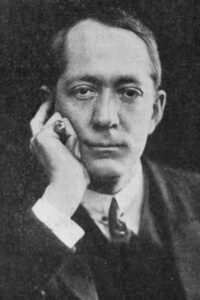
The Green God
He was bronzed and rugged with the mark of the traveler upon him, and although his face at first impressed me unpleasantly, the impression was dispelled in part at least by his peculiarly attractive smile. I informed him that I could not direct him to the place in question, since I was myself a comparative stranger to that part of England. He then asked me if I was going toward Exeter. Upon my informing him not only that I was, but that I was particularly desirous of reaching it before the coming of the rain, he at once invited me to get into the car, with the remark that he could at least carry me the major part of the way.
I hesitated a moment, but, seeing no reason to refuse the offer, I thanked him and got into the car, and we proceeded toward the town at a fairly rapid rate. My companion seemed disinclined to talk and puffed nervously at a long cheroot. I lighted my pipe, with some difficulty on account of the wind, and fell to studying the face of the man beside me. He was a good-looking fellow, of a sort, with a somewhat sensuous face, and I felt certain that his short, stubby black mustache concealed a rather cruel mouth. A man to gain his ends, I thought, without being over nice as to the means he employed. Presently he turned to me. “I understand,” he said, “that Major Temple’s place is upon the main road, about half a mile this side of Exeter. There is a gray-stone gateway, with a lodge. I shall try the first entrance answering that description. The Major only leased the place recently, so I imagine he is not at all well-known hereabouts.” He leaned forward and spoke to his chauffeur.
I explained my presence upon the Exeter road and suggested that I would leave the car as soon as we reached the gateway in question, and continue upon foot the balance of my way. My companion nodded, and we smoked in silence for a few moments. Suddenly, with a great swirl of dead leaves, and a squall of cold rain, the storm broke upon us. The force of the gale was terrific, and although the car was provided with a leather top, the wind-swept rain poured in and threatened to drench us to the skin. My companion drew the heavy lap-robe close about his chin and motioned to me to do likewise, and a moment later we turned quickly into a handsome, gray-stone gateway and up a long, straight gravel road, bordered on each side by a row of beautiful oaks. I glanced up at my new acquaintance in some surprise, but he only smiled and nodded, so I said no more, realizing that he could hardly set me down in the face of such a storm.
We swirled over the wet gravel for perhaps a quarter of a mile, through a fine park, and with a swift turn at the end brought up under the porte-cochère of a large, gray-stone house of a peculiar and to me somewhat gloomy and unattractive…
Read or download Book
Frederic Arnold Kummer
Frederic Arnold Kummer Sr. (August 5, 1873 – November 22, 1943) was an American author, playwright and screenwriter. He also used the pseudonym Arnold Fredericks. Several of his works were made into movies. A caricature of him is on the wall of Sardi’s restaurant.
Early life
Frederic Arnold Kummer was born in Catonsville, Maryland, to Arnold Kummer. His father was a banker and his mother was of a Quaker family. He was educated in public schools and Rensselaer Polytechnic Institute.
Career
Kummer became a life member of the American Society of Civil Engineers and assistant editor of the Railroad Gazette. He also became the president of a wood block paving company, but the company failed during the Panic of 1907. Kummer then became an author. Kummer wrote stories and plays. He wrote the play The Painted Woman which premiered at the Auditorium Theatre in 1917. It came to Baltimore in 1938 as the opera Captive, with music by Gustav Strube. In testimony to the House of Representatives Special Committee on Un-American Activities, he was noted as a member of the executive committee of the XV International Brigade, a volunteer military unit that fought for the pro-socialist Republic of Spain during the Spanish Civil War.
Personal life
Kummer built a house in Guilford, Maryland. He later relocated to West Lafayette and later Park Avenue in Baltimore. Kummer married twice. He first married playwright Clare Kummer (born Clare Rodman Beecher) in 1895. They had two daughters, Marjorie (who married English actor Roland Young) and Frederica. They divorced in 1903 (she was remarried to Arthur Henry in 1910). Kummer also had three more children. His son Frederic Arnold Kummer Jr. was also an author. In 1927, Kummer was hospitalized at Union Memorial Hospital and newspapers falsely reported his death. He died on November 22, 1943, at his home at 1501 Park Avenue in Baltimore. He was buried at Loudon Park Cemetery.






